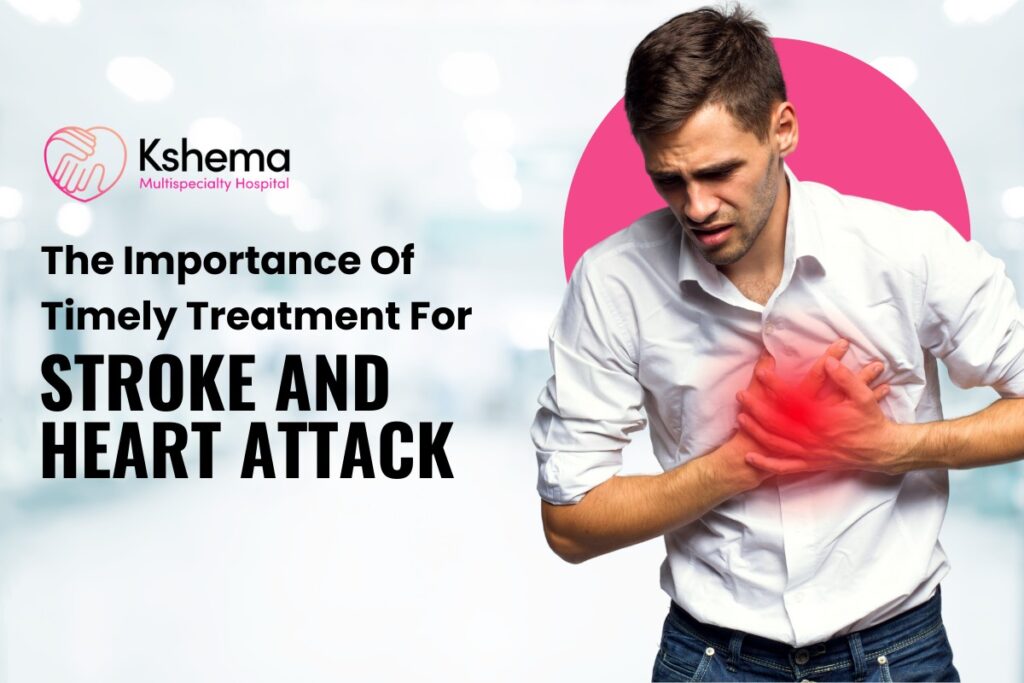When it comes to stroke and heart attacks, time is everything. Both conditions are life-threatening medical emergencies that require immediate attention. Quick intervention not only saves lives but can also prevent lasting complications. In this blog, we’ll explore the importance of timely treatment for stroke and heart attack and why understanding the symptoms and acting quickly is critical.
The Importance of Timely Treatment for Stroke and Heart Attack
Both strokes and heart attacks result from the sudden blockage of blood flow to critical areas of the body. In a heart attack, blood flow to the heart is obstructed, leading to heart tissue damage, while in a stroke, blood flow to the brain is restricted, risking permanent brain damage. Without rapid intervention, these conditions can lead to severe outcomes, including disability or death.
“Golden Hour” in Emergency Care
The first hour following the onset of stroke or heart attack symptoms is known as the “golden hour” in emergency medicine. Medical interventions within this period can drastically increase survival rates and reduce the risk of severe complications. Immediate treatment restores blood flow to the affected areas, minimizing damage to the heart problem or brain health.
Recognizing the Symptoms of Stroke and Heart Attack
One of the most important ways to ensure timely treatment is to be aware of the symptoms associated with these conditions. Recognizing the warning signs and acting quickly can save lives.
Heart Attack Symptoms
Heart attacks often manifest through a range of symptoms, which may include:
- Chest pain or discomfort, often described as a squeezing or heavy feeling
- Pain radiating to the jaw, neck, back, or arms
- Shortness of breath, sweating, nausea, or dizziness
- Unexplained fatigue or anxiety
Stroke Symptoms: Think “FAST”
For stroke, the acronym FAST helps identify common symptoms:
- Face drooping on one side
- Arm weakness or numbness, especially on one side
- Speech difficulties or slurring of words
- Time to call emergency services if any of these symptoms are present
Knowing these signs can help ensure that you or a loved one receives prompt medical care.
Timely Treatment Options for Stroke and Heart Attack
Immediate treatment protocols differ for heart attacks and strokes but aim at restoring normal blood flow and reducing damage.
Heart Attack Treatment Options
- Medications: Clot-busting drugs like thrombolytics can dissolve clots in the heart’s arteries.
- Angioplasty and Stenting: In emergency cases, a minimally invasive procedure can open blocked arteries.
- Coronary Bypass Surgery: Severe cases may require surgical intervention to bypass blocked blood vessels.
Stroke Treatment Options
- Clot-Dissolving Medications (tPA): For ischemic strokes, a tissue plasminogen activator (tPA) can dissolve the clot if administered within a few hours.
- Endovascular Procedures: Catheter-based techniques can remove the clot directly.
- Surgical Options: Hemorrhagic strokes may require surgery to repair a ruptured blood vessel.
Long-Term Benefits of Quick Action
When immediate treatment is administered, the chances of a complete or significant recovery increase substantially. Timely intervention can:
- Reduce the extent of heart and brain damage
- Minimize the risk of chronic heart disease or cognitive impairments
- Decrease the likelihood of recurring episodes
- Enhance the overall quality of life for survivors
Preventing Heart and Stroke Emergencies Through Lifestyle
While recognizing symptoms and acting fast is essential, prevention is the best medicine. Adopting heart-healthy habits can go a long way in reducing the risk of both heart attacks and strokes.
- Healthy Diet: A balanced diet rich in fruits, vegetables, whole grains, and lean proteins supports cardiovascular health.
- Regular Exercise: Physical activity strengthens the heart, improves circulation, and helps manage blood pressure.
- Managing Stress and Avoiding Smoking: These habits promote better heart and brain health and lower the chances of blood clots.
- Routine Check-ups: Regular visits to your doctor for blood pressure, cholesterol, and glucose checks are key in early detection.
When Every Second Counts, Trust Kshema Hospital
At Kshema Hospital, we understand the urgency of stroke and heart attack treatment. Our team of specialists is trained to act swiftly, utilizing state-of-the-art diagnostic and treatment technology to provide immediate care. From emergency procedures to ongoing support for heart disease information and more, we’re here to guide you every step of the way to ensure the best possible outcomes.
Remember, timely treatment can make all the difference. If you suspect a stroke or heart attack, don’t wait—call emergency services immediately. For more information on prevention and care, reach out to Kshema Hospital and take proactive steps towards a heart-healthy life.
Your Heart and Brain Deserve Immediate Attention
When you know the signs and understand the importance of quick intervention, you’re equipped to save lives—maybe even your own. To learn more about how we’re committed to heart disease information and brain health, contact us at +918105901694 or kshemamsh@gmail.com, and let’s work together to prioritize your well-being.



